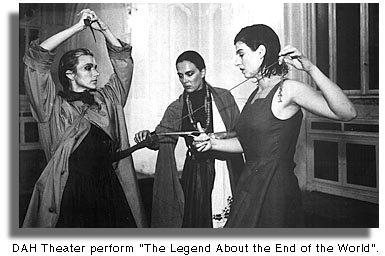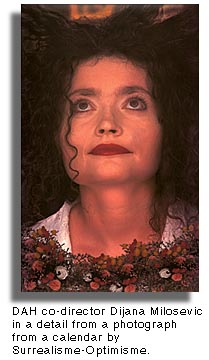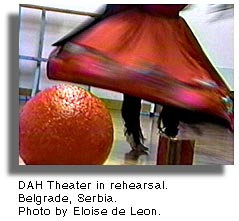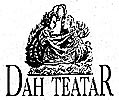"Why we were doing theater, it was a kind of test."
DAH Theater
Experimental Theater in ex-Yugoslavia Part 3 of "Creating Art in the Balkans" by Eloise de Leon
An interview with Jadranka Andelic
DAH Theatre is an experimental theatre group in Belgrade. It is comprised of two directors and three actors. It's directors are Jadranka Andelic and Dijana Milosevic. The actors are Maja Mitic, Sanja Krsmanovic-Tasic and Valentina Milivojevic. This interview took place in May, 1996, one month after the sanctions were lifted n Serbia. I began this interview with a question about what it was like to work in the "former Yugoslavia". The term refers to the countries that formerly comprised Yugoslavia. Now only Serbia and Montenegro are titled the 'Federal Republic of Yugoslavia'. Jadranka: "A lot of people use this term, 'former Yugoslavia'. It is a bit paradoxical because if it is 'former' it doesn't exist. People like to understand where we are coming from. I'm just saying this because its a paradoxical and a little bit schizophrenic term. I started DAH Theatre with my colleague and friend, Dijana Milosevich in 1990-91. It is actually the first independent group in this ex-Yugoslavia. The group corresponds with the beginning of the war and these circumstances made the beginning really difficult. You had to have a strong motivation and reason to do theater work and start a group in the war situation around us. Of course you should know that in Belgrade the war was never fought. But you can imagine how big the cries were thinking about the feelings of the people, not to speak about the economical cries. Total lack of everything, isolation, political pressure, nationalism, etc., so that was the beginning. It was difficult but in some way, thinking about the art helped us to be really clear with ourselves--why we were doing theater, it was a kind of test. Did we have enough strength to continue to survive as artists?
Our idea was to make a laboratory, a theater research group. In the first year we were just working in the room and that was especially difficult because the actors were quite confused why we were not playing the performance. And in the conditions I described, it was even more difficult to find motivation for a closed laboratory work, research, very deep research on the actors skill and technique and directors' different techniques. It was a difficult time but I can see now that the base became even stronger. The sanctions made life in this society very, very difficult. The salary was sometimes 10 dollars a month for some people or even less. It was a huge difference from, I don't know, 1,000 to 10 dollars. Sometimes you couldn't drive the car because there was not petrol, there was not petrol to warm the houses, there was light restriction. It was really difficult to survive, you had to be brave to continue. A lot of people left, a lot of intellectuals. I think most of my friends for example, colleagues, artistic friends, they left the country at the beginning or just before the beginning. A lot of friends are living for example, in U.S. or in Canada or Australia, far away countries. Also a very big problem were the sanctions that separated us from some other societies in the sense of communication and information. Maybe because of the situation in our country, the need for getting in touch with other artists in Europe and to develop in this context was stronger. My biggest fear was of closing the borders, this fear was of the possibility not to communicate with colleagues of other countries. I think we missed a lot support from outside. The sanctions put this barrier for some people abroad not to see that there is, let's say, some healthy seed here.
Artistically speaking we had some kind of moral and ethic responsibility to express ourselves in these circumstances. For example in Edinburgh Festival in Britain we looked like representatives from Serbia instead of as free artists or humans. So we had to find a way to deal with these things, and then again we come back first, to our artistic expression. Theater as a place to express our thoughts, our beliefs, and our way of life. Lots of times when we had discussions or conflicts with people we would say "come and see our work. [interviewer's note: conflicts arose when people protested DAH Theatre's presence in theatre festivals, because they were from Serbia] Our work speaks for us. We are not politicians. We are not official representatives of any state. What we believe we say in our work." We make performances about our life, not literally speaking, we never do narrative realistic theater, but you can think about us from our work. In mid-1995, all performances we made at this time, refer to the conditions in life in which we lived. The performance of Babylonian confusion with Bertolt Brecht poems which were very clearly anti-war, we played on the street in very risky times. Then we played Zanic which was based on the destiny of one artistic movement in Yugoslavia that was dealing with how it's possible to make continuity, which is a very big problem for us here, maybe in all Europe. How to build something with continuity, how to survive all circumstances which try to destroy it, which happens normally in history.
I was in Denmark when the peace contract in Dayton was signed. I was watching on the Danish TV. I was very moved, I was crying, because it was something I was waiting for. I called my mother, and my friends, and asked how people were celebrating. They said nothing happened. I thought my god, is this possible? Why are they not so happy? I think people had relief but most people were aware that it is not so easy. Most of the tensions and the energy that everyone was keeping trying to survive was now coming as a wave of sorrow and anger. Now even more than in the beginning you could see the senseless 'missing the point' of everything, the total stupidity of this war in every sense. Many people think about the politics, asking "why all of this?". So maybe the feeling of sadness is even stronger. The sanctions are officially over and people are faced with the fact that they have to think about very concrete things, the economy...about concrete problems that exist apart from the war and always existed, and I think now its very difficult to find new energy to deal with very normal political and social problems because people are exhausted from trying to find the energy for survival. It's really difficult to think about the present moment. You can speak and discuss and comment on all the societies and wars in the world, but it's very difficult to speak about the present. It's really sort of a special experience to catch what is going on. I can see now, four years ago. I can see what, in 1989-90, was leading to this. It's fantastic that I can understand this chain of events that led us to this moment but its really difficult to speak about the present and I don't know what is the future. I cannot understand the direction of the leading politicians. I think that what happened, not only for Serbia, is that by separating the countries you get closed societies, closed because they are trying to impose their unique national values. My feeling is that then all the societies become very poor. I think it's most important to open society for communication, exchange and learning. I must say, one of the most important characteristics of life in Belgrade, was that it was a very alive place, a kind of crossroads. It was one of the most important characteristics of ex-Yugoslavia. I think the very big danger of this society now, is the definite loss of many people of my generation, or young people, and loss forever of energy of the artists, intellectuals or nice clever people who can build something else other than the national program. Fax from Jadranka in February, 1997: "....apart from our normal work in DAH Theatre, we were involved in protest demonstrations in Beograde...I can tell you that it is really big, big transformation of mass energy-in positive, creative and in decision to change something. I hope it will keep on like that."
|
||||||||
 Eloise de Leon is an artist coach, writer and filmmaker currently living in New York. Her articles may be found in the Art Changes and Human Rights / Civil Rights sections of In Motion Magazine. Her website is: www.insightandjoy.com and her email is: eloisemargaret@gmail.com. Eloise de Leon is an artist coach, writer and filmmaker currently living in New York. Her articles may be found in the Art Changes and Human Rights / Civil Rights sections of In Motion Magazine. Her website is: www.insightandjoy.com and her email is: eloisemargaret@gmail.com. |
||||||||
| Orignially published in In Motion Magazine, September 1996. | ||||||||
If you have any thoughts on this or would like to contribute to an ongoing discussion in the  What is New? || Affirmative Action || Art Changes || Autonomy: Chiapas - California || Community Images || Education Rights || E-mail, Opinions and Discussion || En español || Essays from Ireland || Global Eyes || Healthcare || Human Rights/Civil Rights || Piri Thomas || Photo of the Week || QA: Interviews || Region || Rural America || Search || Donate || To be notified of new articles || Survey || In Motion Magazine's Store || In Motion Magazine Staff || In Unity Book of Photos || Links Around The World NPC Productions Copyright © 1995-2020 NPC Productions as a compilation. All Rights Reserved. |



 In the first years it was an incredibly big shock, a psychological shock, what was happening around us. It was almost every day questioning should we work or not? Is there any sense while people are dying to make a theater? And it was a really big work that Dijana and I did and wanted, to encourage the people around us of the artist's possibility to create something good, to create some sense in this senseless and destructive society in the time in which we lived. It was as Grotowsky said once, 'the place of freedom' not only literally, not freedom like you go to prison or not, but inner freedom, inner possibility to survive.
In the first years it was an incredibly big shock, a psychological shock, what was happening around us. It was almost every day questioning should we work or not? Is there any sense while people are dying to make a theater? And it was a really big work that Dijana and I did and wanted, to encourage the people around us of the artist's possibility to create something good, to create some sense in this senseless and destructive society in the time in which we lived. It was as Grotowsky said once, 'the place of freedom' not only literally, not freedom like you go to prison or not, but inner freedom, inner possibility to survive. DAH Theatre traveled quite a lot in this period. We could meet people and speak how it is, who are we, what we think, and speak that there are other people and how they are think. You can not have a society that they all think the same. I know that it was also a test, how to communicate with people that very often look at you with prejudice that you are coming from Serbia although we can not speak very precisely about nationalities. Ex-Yugoslavia was a multi-national country so we are very mixed. You cannot declare yourself as a member of a nationality. You can say you are living in this country, yes. So, it was very strange meeting with some people that look at you like an "evil Serb" and maybe you're not even Serb at all. This was the paradox, but this is the division of ex-Yugoslavia, that made all these parts too simple--all people that come from Croatia, Croatian; Bosnia, Bosnian; Serbia, Serbs, etc. I didn't believe how the official politics of this state were working, but I must say it really amazes me that for five years people didn't receive any one picture from Belgrade, no reportage from Belgrade. The sanctions were working for both sides.
DAH Theatre traveled quite a lot in this period. We could meet people and speak how it is, who are we, what we think, and speak that there are other people and how they are think. You can not have a society that they all think the same. I know that it was also a test, how to communicate with people that very often look at you with prejudice that you are coming from Serbia although we can not speak very precisely about nationalities. Ex-Yugoslavia was a multi-national country so we are very mixed. You cannot declare yourself as a member of a nationality. You can say you are living in this country, yes. So, it was very strange meeting with some people that look at you like an "evil Serb" and maybe you're not even Serb at all. This was the paradox, but this is the division of ex-Yugoslavia, that made all these parts too simple--all people that come from Croatia, Croatian; Bosnia, Bosnian; Serbia, Serbs, etc. I didn't believe how the official politics of this state were working, but I must say it really amazes me that for five years people didn't receive any one picture from Belgrade, no reportage from Belgrade. The sanctions were working for both sides.